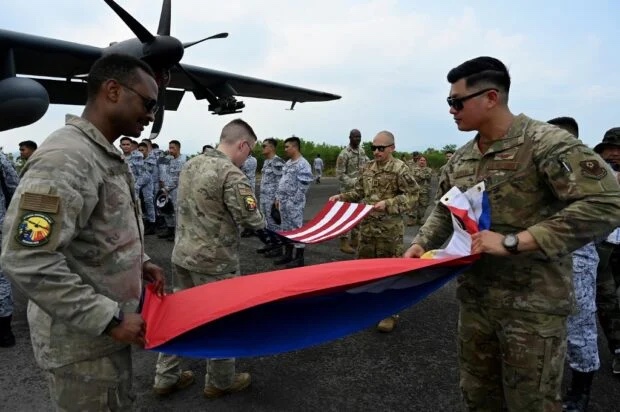Groups opposing Balikatan with US: It brings PH-China conflict

In this file photo taken on April 23, 2023, US soldiers fold a US and Philippine flags at Subic Bay Freeport Zone as part of the US-Philippines joint military exercise “Balikatan.” JAM STA ROSA / Agence France-Presse
MANILA, Philippines — Several progressive groups have insisted that the Balikatan military exercises between the Philippines and the United States (US) only put the Asian country in harm’s way, as it could trigger higher tensions over the West Philippine Sea (WPS).
Karapatan, Bagong Alyansang Makabayan (Bayan), Gabriela party list, and Bayan Muna party-list released separate statements on Monday condemning President Ferdinand Marcos Jr.’s administration for allowing the exercises. All of them said that the war drill only placed the Philippines in China’s crosshairs.
READ: Around 16,000 US, PH personnel joining Balikatan 2024 — AFP
Balikatan, which will involve around 16,000 members of the Armed Forces of the Philippines (AFP) and the US Military, is scheduled to start on Monday and last until May 18.
“In the wake of escalating tensions in the [WPS], we vehemently condemn the decision of Marcos Jr. to exacerbate conflict dynamics by conducting one of the biggest Balikatan exercises in the country. This move not only jeopardizes regional stability but also marks a distressing capitulation of Philippine sovereignty to former colonizers,” Gabriela Rep. Arlene Brosas said.

“As it is, the Balikatan exercises starting today up to May 18, especially amid the tensions in the West Philippine Sea, exemplify the dangers of playing one superpower against the other. It puts the Philippines in a precarious position, caught in the middle of power struggles,” former lawmaker and Bayan Muna vice president Carlos Zarate said.
Karapatan meanwhile warned that the presence of US soldiers and armaments alone could make the Philippines a potential target of a Chinese military attack.
READ: US Defense chief says PH more than an ally: We’re family
“The heavy presence of American military troops and armaments in the country already makes the Philippines a potential target of military attack by China,” Karapatan also said.
“Notwithstanding China’s intensifying incursions into the Philippines’ exclusive economic zone, Ferdinand Marcos Jr. is condemnable for allowing the US to exploit this issue and willfully acting as a pawn in the US’ gameplan against China, especially if he deliberately sacrifices or recklessly endangers Filipino lives to provide a rationalization for direct US military intervention in the South China Sea conflict,” it added.
According to a post on the US Embassy in the Philippines’ website dated April 17, there will also be participants from the Australian Defense Force and the French Navy, while 14 nations will participate as part of the AFP-hosted international observer program — Brunei, Canada, France, Germany, Great Britain, India, Indonesia, Japan, Malaysia, New Zealand, Republic of Korea, Singapore, Thailand, and Vietnam.
READ: US, Japan, PH to China: Stop ‘coercive use’ of coast guard in SCS
“During Balikatan 2024, participants will execute a range of complex missions across domains, including maritime security, sensing and targeting, air and missile defense, dynamic missile strikes, cyber defense, and information operations. The Philippine Navy, U.S. Navy and the French Navy will also conduct a Multilateral Maritime Exercise in the Philippines’ exclusive economic zone,” the post read.
“This includes exercises in protecting key terrain in Luzon and Palawan in support of territorial defense; rapidly moving long range, precision strike capabilities and using them in targeting simulated threats; tracking simulated air threats and targeting them with multiple air and missile defense systems; and integrating multilateral air and land platforms to increase awareness of the maritime security situation. Exercise forces will conclude by targeting simulated enemy forces and sinking an ‘enemy’ ship,” it added.
Bayan, however, believes that such exercises are costly and disrupt many industries, especially in the areas where they are held.
“Balikatan is costly, disruptive, and destructive to the environment. Public resources are redirected to host foreign troops instead of prioritizing the people’s urgent concerns like the delivery of basic social services. Balikatan disrupts the livelihoods of farmers and fishers who are already reeling from the harsh impact of El Niño,” Bayan said.
“Balikatan leaves a dirty footprint on the environment and its toxic legacy has caused suffering among our people. The military weapons provided by the US are used to bomb rural communities and displace residents who are opposing the operations of destructive extractive companies,” it added.
READ: Biden reiterates: Any attack on PH aircraft, ship in SCS will invoke MDT
The latest wave of military exercises comes as tensions are high in the West Philippine Sea due to China’s recent aggressive actions and complaints from the Philippine Coast Guard vessels about their Chinese counterparts resorting to water cannon attacks.
During the recently concluded trilateral summit between the Philippines, the US, and Japan, the three countries reiterated the need for a free and open Indo-Pacific so that regional stability would be maintained.
All three countries have also expressed concerns about China’s aggressive actions in the South China Sea, calling on the Asian superpower to stop using its Coast Guard in a coercive manner.
Washington also reaffirmed its defense commitments to the Philippines — with US President Joe Biden reminding the world that any attack on a Philippine aircraft, vessel, or armed force in the South China Sea would trigger the Mutual Defense Treaty.